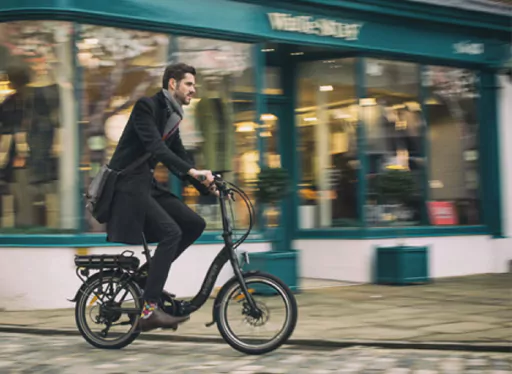Commuting – an e-bike will get you out of your car
Millions of people do it every day – after their coffee and breakfast they trudge off to work in their cars and join the queues of traffic with their blood pressure rising and at speeds that let’s face it, are often slower than walking. Other than sitting on the bus with menacing teenagers at the back, the other has long been to go to work on your bicycle.
Traditional bicycle commuting has a bit of a bad reputation. Especially bike friendly businesses, perhaps those on the Cycle To Work Scheme, may have showers available for your sweaty, red faced colleagues to have a quick wash and get out of their lycra before joining you. Most don’t and your rosy faced colleague will emit unpleasant fragrances across their office throughout the day.
Electric bikes to the rescue
Electric Bikes take the sweat out of commuting, which can be very good even for the non-cyclist who doesn’t have to put up with your fragrance. On a good commuting machine, perhaps a Haibike SDURO Trekking series electric bike, you will barely break a sweat even over a 5-7 mile ride. Why? You can programme it to put in twice the energy you put in yourself, so a three mile ride will effectively become a one mile ride. Hills become flat too.
London?
The Greater London Authority is really keen to get people to work on their bike instead of cars. There are statistics that 9,000 Londoners die unnecessarily a year due to the pollutants in the air. Car fumes play a major role in knocking people off their perches. While as a Londoner you may have run into the major debates around cycling infrastructure you may not know that Transport for London is actively supporting Londoners to get on their e-bikes. E-Bikes Direct are part of this, and through this link offer a 10% discount on electric bikes on the scheme.
Other cities are getting in on the act. Why is this the case?
Research shows electric bikes are a great way of commuting!
Research from around the world suggests that people prefer to use their e-bikes to go to work than their cars. In 2012 the Dutch government published research that concluded e-bikes could reduce car use on commuting trips by between 4% to 9%.
Research from Ghent University in Belgium, published last year, “shows how the usage of the e-bike is higher on working days than on weekends. Based on the average speed, we confirmed our preliminary results i.e., longer trips are correlated with a higher average speed and that they are performed more often during working days. This suggests a tendency of people to use the e-bike as a commuting mode. Moreover, due to longer distance cycled during working days, this result could also anticipate the interest of people in using e-bikes instead of cars for certain distances (within 13 km).”
In short, for trips of less than around 10 miles each way electric bike owners in Belgium will use their e-bikes rather than cars. If you’re still into using your car, consider this: e-bikes often have faster travel times than by car. A recent survey of e-bike users suggested that their average speed is between 11 and 15mph – up to double London’s average traffic speed of 7mph! That means you can perhaps sleep an extra half hour every day – not a bad incentive to have an e-bike.
Bike theft fears
There is a problem in London where nice bikes get nicked by people who know that a pair of good bolt crops are cheaper than a £3000 bike. Commuters often buy a folding electric bike to take into their office (and can easily be taken on the train too). Another way forward of course is to buy something that is cheap to replace – have a look at our low priced electric bikes here. The idea behind that is that a cheaper bike is less desirable and is less likely to be stolen.
The takeaway
If you want to get to work more quickly without stinking out your office, yet have lower blood pressure from sitting in traffic (and live longer as a result!) then an e-bike could well be a great investment for commuting to work. Those who do buy an e-bike to commute never look back – e-bikes are really that big a step change from commuting to work by car.










